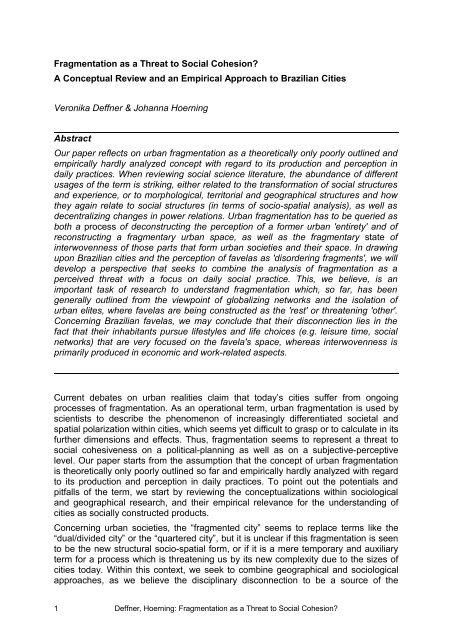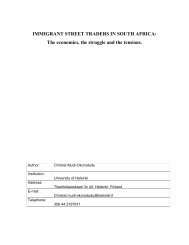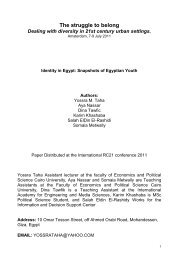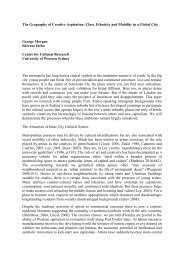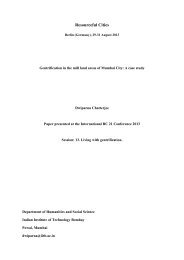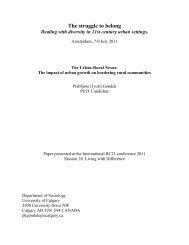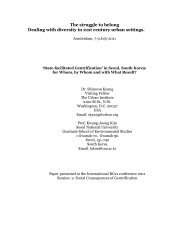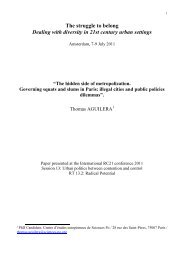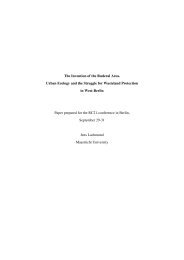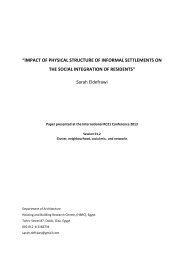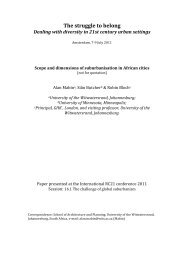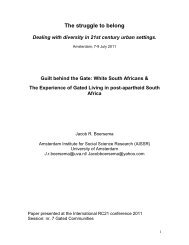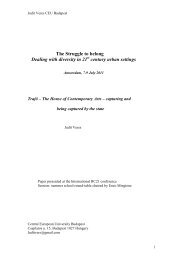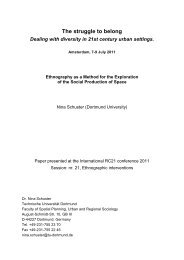Fragmentation as a threat to social cohesion - RC21 ORG ...
Fragmentation as a threat to social cohesion - RC21 ORG ...
Fragmentation as a threat to social cohesion - RC21 ORG ...
You also want an ePaper? Increase the reach of your titles
YUMPU automatically turns print PDFs into web optimized ePapers that Google loves.
<strong>Fragmentation</strong> <strong>as</strong> a Threat <strong>to</strong> Social Cohesion?<br />
A Conceptual Review and an Empirical Approach <strong>to</strong> Brazilian Cities<br />
Veronika Deffner & Johanna Hoerning<br />
Abstract<br />
Our paper reflects on urban fragmentation <strong>as</strong> a theoretically only poorly outlined and<br />
empirically hardly analyzed concept with regard <strong>to</strong> its production and perception in<br />
daily practices. When reviewing <strong>social</strong> science literature, the abundance of different<br />
usages of the term is striking, either related <strong>to</strong> the transformation of <strong>social</strong> structures<br />
and experience, or <strong>to</strong> morphological, terri<strong>to</strong>rial and geographical structures and how<br />
they again relate <strong>to</strong> <strong>social</strong> structures (in terms of socio-spatial analysis), <strong>as</strong> well <strong>as</strong><br />
decentralizing changes in power relations. Urban fragmentation h<strong>as</strong> <strong>to</strong> be queried <strong>as</strong><br />
both a process of deconstructing the perception of a former urban 'entirety' and of<br />
reconstructing a fragmentary urban space, <strong>as</strong> well <strong>as</strong> the fragmentary state of<br />
interwovenness of those parts that form urban societies and their space. In drawing<br />
upon Brazilian cities and the perception of favel<strong>as</strong> <strong>as</strong> 'disordering fragments', we will<br />
develop a perspective that seeks <strong>to</strong> combine the analysis of fragmentation <strong>as</strong> a<br />
perceived <strong>threat</strong> with a focus on daily <strong>social</strong> practice. This, we believe, is an<br />
important t<strong>as</strong>k of research <strong>to</strong> understand fragmentation which, so far, h<strong>as</strong> been<br />
generally outlined from the viewpoint of globalizing networks and the isolation of<br />
urban elites, where favel<strong>as</strong> are being constructed <strong>as</strong> the 'rest' or <strong>threat</strong>ening 'other'.<br />
Concerning Brazilian favel<strong>as</strong>, we may conclude that their disconnection lies in the<br />
fact that their inhabitants pursue lifestyles and life choices (e.g. leisure time, <strong>social</strong><br />
networks) that are very focused on the favela's space, where<strong>as</strong> interwovenness is<br />
primarily produced in economic and work-related <strong>as</strong>pects.<br />
Current debates on urban realities claim that <strong>to</strong>day’s cities suffer from ongoing<br />
processes of fragmentation. As an operational term, urban fragmentation is used by<br />
scientists <strong>to</strong> describe the phenomenon of incre<strong>as</strong>ingly differentiated societal and<br />
spatial polarization within cities, which seems yet difficult <strong>to</strong> gr<strong>as</strong>p or <strong>to</strong> calculate in its<br />
further dimensions and effects. Thus, fragmentation seems <strong>to</strong> represent a <strong>threat</strong> <strong>to</strong><br />
<strong>social</strong> cohesiveness on a political-planning <strong>as</strong> well <strong>as</strong> on a subjective-perceptive<br />
level. Our paper starts from the <strong>as</strong>sumption that the concept of urban fragmentation<br />
is theoretically only poorly outlined so far and empirically hardly analyzed with regard<br />
<strong>to</strong> its production and perception in daily practices. To point out the potentials and<br />
pitfalls of the term, we start by reviewing the conceptualizations within sociological<br />
and geographical research, and their empirical relevance for the understanding of<br />
cities <strong>as</strong> <strong>social</strong>ly constructed products.<br />
Concerning urban societies, the “fragmented city” seems <strong>to</strong> replace terms like the<br />
“dual/divided city” or the “quartered city”, but it is unclear if this fragmentation is seen<br />
<strong>to</strong> be the new structural socio-spatial form, or if it is a mere temporary and auxiliary<br />
term for a process which is <strong>threat</strong>ening us by its new complexity due <strong>to</strong> the sizes of<br />
cities <strong>to</strong>day. Within this context, we seek <strong>to</strong> combine geographical and sociological<br />
approaches, <strong>as</strong> we believe the disciplinary disconnection <strong>to</strong> be a source of the<br />
1 Deffner, Hoerning: <strong>Fragmentation</strong> <strong>as</strong> a Threat <strong>to</strong> Social Cohesion?


